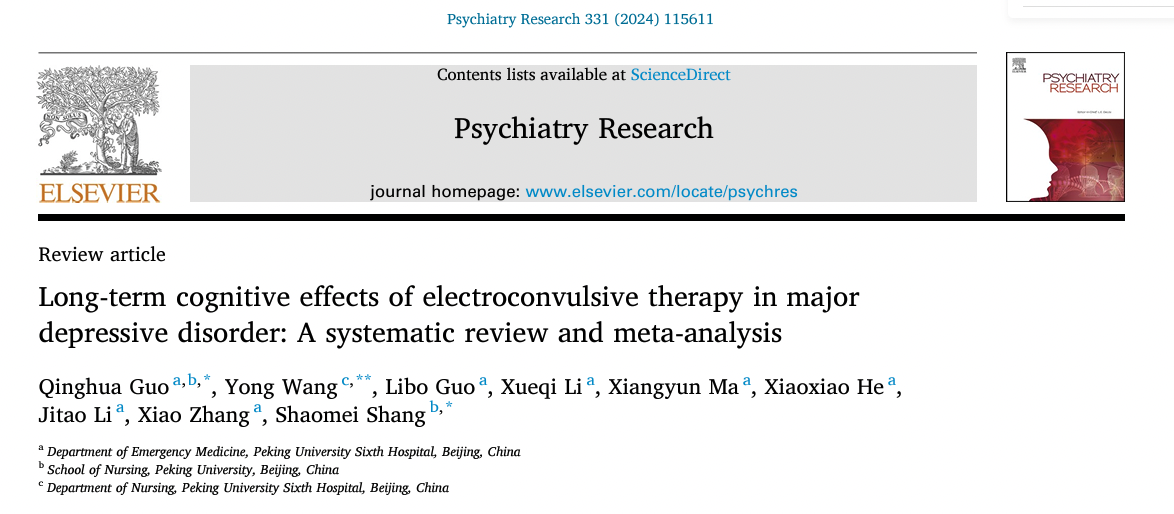Cognitive Assessment Instruments For ECT Compared: New Review From China
Out on PubMed, from authors in China, is this review:
Long-term cognitive effects of electroconvulsive therapy in major depressive disorder: A systematic review and meta-analysis.
Psychiatry Res. 2023 Dec 1;331:115611. doi: 10.1016/j.psychres.2023.115611. Online ahead of print.PMID: 38101070 Review.

Objective: Electroconvulsive therapy (ECT) is endorsed as a principal treatment approach for major depressive disorder (MDD) worldwide. Despite prior studies highlighting potential short-term cognitive deficits post-ECT, the debate regarding its long-term implications persists. This study endeavors to elucidate the reasons for this contention using an evidence-based approach.
Methods: This investigation, meticulously aligned with PRISMA guidelines, was prospectively enlisted on PROSPERO (CRD42023439259). A comprehensive search was performed across various databases, including PubMed, Cochrane Library, Web of Science, Embase, SCOPUS, PsycINFO, CINAHL Plus, and OpenGrey. This review, traversing the literature from inception until June 2023, encapsulated 10 studies (five RCTs and five quasi-experimental studies) involving a cohort of 868 individuals diagnosed with major depressive disorder.
Results: The meta-analysis revealed that the persistent discourse on ECT-induced long-term cognitive impairment chiefly emanates from the inadequacies in the specificity and sensitivity of conventional assessment instruments. Conversely, subgroup analyses showed that cognitive impairment in ECT, as gauged by the nascent assessment tool, Electroconvulsive Therapy Cognitive Assessment (ECCA) (SMD = -0.94, 95 % CI [-1.33, -0.54], p < 0.00001), exerted a detrimental influence on the long-term trajectory of individuals with MDD. Notably, there was an adverse effect of ECT on the subdomain of long-term learning cognitive abilities in patients with MDD (SMD = -0.37, 95 % CI [-0.55, -0.18], p < 0.0001). Contrarily, memory (SMD = 0.16, 95 % CI [-0.02, 0.34], p = 0.08), attention (SMD = 0.23, 95 % CI [-0.07, 0.54], p = 0.14), language (SMD = -0.10, 95 % CI [-0.25, 0.05], p = 0.19), spatial perception, and orientation (SMD = -0.04, 95 % CI [-0.28, 0.20], p = 0.75) exhibited no significant detriments. Intriguingly, ECT showed favorable effects on executive function and processing speed among patients with MDD (SMD = 0.52, 95 % CI [0.29, 0.74], p < 0.00001).
Conclusion: This meta-analysis underscores ECCA's superior sensitivity of the ECCA compared to the MMSE or MoCA in detecting cognitive changes in patients with post-ECT MDD. Following Electroconvulsive Therapy (ECT), deterioration was observed in overall cognitive function and learning capabilities, while memory, attention, language, and spatial perception remained stable. Notably, enhancements were discerned in executive function and processing speed, which not only augmented academic perspectives but also steered the formulation of international clinical guidelines, accentuating the progressive role of ECT in the therapeutic approach to MDD.
Keywords: Cognitive function; Electroconvulsive therapy; Major depressive disorder; Meta-analysis; Systematic review.
The paper is here.
And from the text:

Well, the ECCA may be a good cognitive assessment tool, but this paper is so flawed that it fails to make that point. Some of the text is incoherent, the referencing is random (AI?), and in the tables the authors of the articles are listed by their first names. Did Psychiatry Research actually review this paper?



Comments
Post a Comment